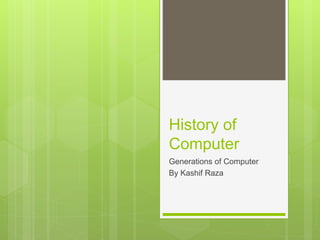
History and Generations of computer
- 1. History of Computer Generations of Computer By Kashif Raza
- 2. What is Computer A computer is an electronic data processing device, which accepts and stores data input, processes the data input, and generates the output and store in a required format.
- 3. Advantages of Computers Advantages of Computers High Speed Accuracy Storage Capability Diligence Versatility Reliability Automation Disadvantages of Computer Dependency Environment No Feeling
- 4. First Generation of Computer Come in 1946-1959 Used vacuum tube as Memory and CPU. Batch processing OS used. Punch cards, paper tape, and magnetic tape was used as input and output devices Used machine code programming language. Examples ENIAC EDVAC UNIVAC IBM-701 IBM-650
- 5. Advantages 1st Generation Vacuum tube technology Unreliable Supported machine language only Very costly Generated a lot of heat Slow input and output devices Huge size Need of AC Non-portable Consumed a lot of electricity
- 6. Second Generation of Computer Comes in 1959-1965. Transistor Technology used. magnetic cores were used as the primary memory and magnetic tape and magnetic disks as secondary storage devices. assembly language and high-level programming languages like FORTRAN, COBOL were used. The computers used batch processing and multiprogramming operating system. Example IBM 1620 IBM 7094 CDC 1604 CDC 3600 UNIVAC 1108
- 7. Feature 2nd Generation Advantages Use of transistors Reliable in comparison to first generation computers Smaller size as compared to first generation computers Generated less heat as compared to first generation computers Consumed less electricity as compared to first generation computers Faster than first generation computers Disadvantages Still very costly AC required Supported machine and assembly languages
- 8. Third Generation of Computer was from 1965-1971. used Integrated Circuits (ICs) remote processing, time-sharing, multiprogramming operating system were used. High-level languages (FORTRAN-II TO IV, COBOL, PASCAL PL/1, BASIC, ALGOL-68 etc.) Examples IBM-360 series Honeywell-6000 series PDP (Personal Data Processor) IBM-370/168 TDC-316
- 9. Feature of 3rd Generation Advantages IC used Mouse and keyboard used for I/O. More reliable in comparison to previous two generations Smaller size Generated less heat Faster Lesser maintenance Consumed lesser electricity Supported high-level language Disadvantages Costly AC required
- 10. Fourth Generation was from 1971-1980. Used Microprocessor chip(5000 transistor). time sharing, real time networks, distributed operating system were used. All the high-level languages like C, C++, DBASE etc. Examples DEC 10 STAR 1000 PDP 11 CRAY-1(Super Computer) CRAY-X-MP(Super Computer)
- 11. Features of 4th Generation Advantages Very cheap Portable and reliable Use of PCs Very small size Pipeline processing No AC required Concept of internet was introduced Great developments in the fields of networks Computers became easily available Disadvantages Very Large Scale Integrated (VLSI) technology used
- 12. Fifth Generation of Computer fifth generation is 1980-till date. ULSI (Ultra Large Scale Integration) technology used microprocessor chips having ten million electronic components. AI (Artificial Intelligence Systems) Robotics Neural Networks Game Playing Development of expert systems to make decisions in real-life situations Natural language understanding and generation Examples Desktop Laptop Notebook Ultra Book Chrome Book
- 13. Features of 5th Generation ULSI technology Development of true artificial intelligence Development of Natural language processing Advancement in Parallel Processing Advancement in Superconductor technology More user-friendly interfaces with multimedia features Availability of very powerful and compact computers at cheaper rates